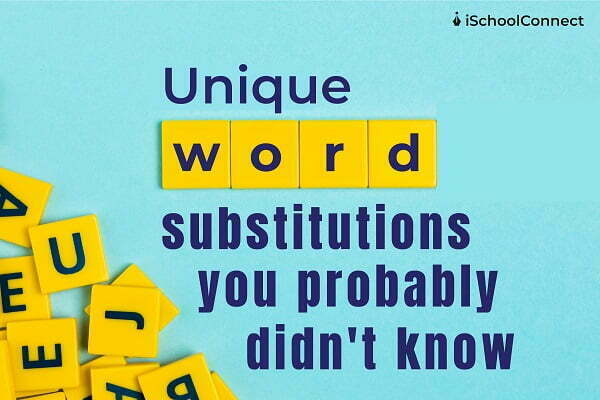Table of Contents
One word substitution is an essential skill, especially if you want to communicate precisely. Using this tool allows you to cut down on large, wordy phrases and be clearer with your sentences. Since many international English tests and exams feature this type of question, it’s best to be prepared. This will show that you have a good grasp of the language. But, is there a reason this writing tool is necessary? Let’s have a look!
What is a one-word substitution?
Simply put, one-word substitution is replacing a long, complicated, or wordy sentence/phrase with one word. This makes the sentence short, crisp, and also more meaningful without being lengthy. Some common types of substitutions involve group names (example: ‘crowd’ instead of ‘a large group of people’). Not only do one-word substitutions in English help you expand your vocabulary, but they also help you write in a brief, to-the-point manner.
To prove this, here is an example-
John is someone who operates a spacecraft and works in space.
John is an astronaut.
What is the purpose of one-word substitutions?

Simplified substitutions help to make reading and understanding easier. It improves the flow of your speech and allows more information to be transmitted with fewer words.
Saying “The people who come to my church are always looking on the brighter side of things” is much longer than putting it like this: “My church’s congregation is full of optimists”.
The complexity is reduced and so is the sentence length. To write better substitutions, you need to learn and familiarise yourself with suffixes and also similar vocabulary.
Additionally, this kind of test helps an examiner or teacher understand what command you have over the language. If your vocabulary is adequate, then you should be able to handle these tests with ease.
So without further delay, let us look into some common one-word substitution examples, categorized under different types-
Study/Work/Education-related substitutions
Some education-related substitutions may be known to you already, but did you know that the suffix ‘ology’ comes from the Latin root word ‘logia?’. It means a subject of study or a branch of knowledge.
| Meaning of the Word | One Word Substitution |
| The scientific study of stars, galaxies, and the universe | Astronomy, cosmology |
| Study of rock, soil, fossils, and more | Geology |
| The field of study dedicated to the mind, emotions, and behavior | Psychology |
| The study of plant life, their interactions, and their relationships | Botany |
| Includes the study of animal life and its evolution | Zoology |
| The study of languages and their evolution | Philology |
When referring to the person who has studied or completed his/her education in a field, the substitutions simply take on a new ending (suffix). An example from the above list would be geology becoming ‘Geologist’.
Let us have a look at some examples with this new suffix-
| Meaning of the Word | One Word Substitution |
| Someone who studies fossils | Paleontologist |
| A person who studies fossils and artifacts specific to humans | Archaeologist |
| Someone who studies the brain, its structure, and the things that affect it | Psychiatrist |
Another way to simplify your sentences with substitutions is to mention the specific profession, rather than explain what the profession is. So here are a few examples-
| Meaning of the Word | One Word Substitution |
| A person who grows and sells flowers and makes floral arrangements | Florist |
| The teacher or staff member who supervises class during an exam | Invigilator |
| The dance instructor who creates dance routines matched to certain music | Choreographer |
| Someone who drives a car for a living, typically for wealthy clients | Chauffeur |
Person-related substitutions
So the previous entries were within the category of study/work. The next list categorizes people based on various characteristics they may have. These types of words are useful when describing oneself or others. It may be especially useful for compact introductions (written or spoken)-
| Meaning of the Word | One Word Substitution |
| Someone who does not believe in the existence of God | Atheist |
| A person who sees the dark/negative side of situations and events | Pessimist |
| Someone who loves mankind/a person who offers financial aid often | Philanthropist |
| A person who speaks multiple languages fluently | Polyglot |
| Someone who prefers to stay away from others | Recluse |
| Someone who boasts and talks about his/her own achievements often | Egotist |
| A person who is selected to settle a fight between two parties | Arbitrator |
So far, we have talked about mostly words associated with a person, but they apply in many other scenarios.
Substitutions for things and descriptive phrases
You can also substitute things and phrases with one word. For example, there is no need to say “a heavy snowstorm with powerful winds” when you can say “a blizzard”. Similarly, if your daily routine is “dull, repetitive, and boring”, you can call it a “mundane” day instead!
Note that this is just a tiny one-word substitute list, the actual extent of substitutions is vast. For now, go through these examples and add them to your vocabulary-
| Meaning of the Word | One Word Substitution |
| Appreciation of beauty and form, according to a set of ideas | Aesthetics |
| A large fire, often used for festivals, large outdoor parties, and similar | Bonfire |
| The parts of a country far from the center and away from rivers | Hinterland |
| When you fail to show attention or care to someone/something | Remiss |
| When a paper or book is published after the writer’s death | Posthumous |
| Humor that is used to expose weaknesses or faults (especially in political commentary) | Satire |
| To enjoy something over a longer period of time | Savor |
| A person who is blamed for things others have done | Scapegoat |
| Having a personal motivation and determination to achieve a goal | Tenacious |
| A type of government with a king, queen, or similar royalty at the head | Monarchy |
| Having extreme physical or mental pain and suffering | Agony |
| Someone who does not follow generally accepted moral values | Immoral |
| A person who betrays his/her group or organization | Renegade |
| Someone who places a lot of importance on accuracy and details | Fastidious |
| A person who loves himself/herself over everyone else | Narcissist |
| When something is first starting, existing, and evolving | Nascent |
| To change direction suddenly and drastically (especially when driving) | Veer |
The benefits of one-word substitution in English
- These substitutions help to avoid the repetition of phrases when talking about a particular subject.
- It allows you the scope to give out more information without sounding boring.
- The meaning of your sentence stays the same but in a smaller package.
- Additionally, it reads better, with a smoother flow and simple embellishments.
- It also aids in structuring your sentences and writing better.
What should I do next?
Our recommendation is to add new words to your one-word substitution dictionary. There are several online resources and tests to challenge yourself and keep learning. Although memorizing these words may be tough, the more you practice, the less you need to memorize.
Also, consider it a fun game. Figuring out the best word to simplify your sentence with the right word. In most cases, these will show up as multiple-choice questions during an exam, so it makes this easier!
If you want to know and are interested in reading topics like this, you can head on to our blogs! If you think we missed out on any you can reach out to us or also comment below!
FAQs
1. What is the importance of one-word substitutions?
One-word substitutions help to make your writing concise and brief. It allows you to do so without sacrificing the meaning of your sentences. It also gives the same amount of information while simultaneously improving your vocabulary.
2. Can there be multiple substitutions for the same phrase/sentence?
Yes, so there may be synonyms when writing substitutes for a sentence or phrase. For example, “something which cannot be seen” may be substituted with “unseen” or “invisible”.
3. What resources can I use to find appropriate substitutions?
A thesaurus is a book that has words listed in a manner of synonyms as well as associated terms. It’s can also be a vital tool when searching for one-word substitutions, while a dictionary is useful when you need to verify whether your substitution is valid.






